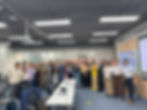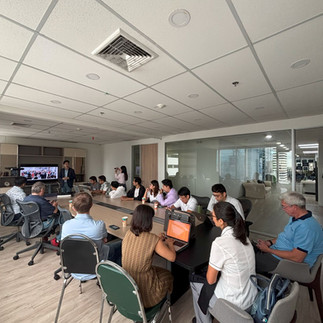By: Assistant Prof. Dr. Tobias Endress
The Social Impact Hackathon: Unite for Action 2025 turned out to be an inspiring and energizing gathering of changemakers, mentors, and experts, all driven by one mission: to create real-world impact. The response to the call for participation was almost overwhelming — registrations had to close early, with about 80 professionals and students from universities such as AIT, Assumption University, and Siam University signing up to take part.

From the very beginning, the atmosphere was buzzing with curiosity and purpose. On Day 1, the event opened with a Challenge Briefing and Kick-off led by Michael Andreassen (Director, iCare Thailand Foundation) and Dr. Tobias Endress (AIT School of Management), setting the tone for two days of intensive collaboration and creativity. This was followed by a series of Impulse Sessions and Expert Talks that offered inspiration and context: Prof. Dieter Trau (AIT Entrepreneurship Center) spoke about modular rural building solutions with Habitech; Richard W. Blossom (Hilltribe Organics) shared how purposeful business can transform communities; Michael Andreassen offered a stark view on poverty in Bangkok’s slums; and Dr. Anish Ghimire (AIT Environmental Engineering) introduced practical innovations for rural water supply. In the afternoon, the students dove into their first Breakout Sessions, guided by experienced mentors, and concluded with a lively “Surgery Session” and dinner get-together.
Day 2 began with another round of Impulse Sessions, which linked vision with venture and technology with impact. Tad Hatchaleelaha (J&C Corporation) and Prof. Khimji Vaghjiani challenged students to think boldly about purpose-driven ventures, while Jan Rohweder (Marketing Bear) shared insights into CRM and smarter customer journeys. The stage was set for the final Changemaker Showcase, where the six teams presented their solutions to the esteemed jury: Tad Hatchaleelaha (J&C Corporation), Vo Loan (Amour Handmade Supply), Monica Singh (Splendid Co.), and Danu Chotikapanich (Cobra International).
The six finalist teams rose to the challenge with remarkable creativity and dedication. Their solutions addressed critical issues ranging from scholarship communication and CRM systems that connect donors and students in meaningful ways, to engineering concepts for sustainable water supply in remote mountain schools, to reimagined rural dormitories and school buildings, and micro-business models designed to bring prosperity and inclusion to underserved communities. Each idea was deeply rooted in the potential to create lasting change, bridging practicality with vision.
Among the teams, Team AquaHope — Pushpalata Neupane, Hafiz Ali Raza, and Hem Raj Bhatta, guided by mentor Khun Supranee — stood out and received three awards: Most Realistic Solution, Most Impactful Concept, and Most Sustainable Solution. Their work is not just a theoretical proposal; it represents a practical approach with clear pathways forward. The team is now beginning to refine their concept and explore opportunities for fundraising, aiming to translate their solution into tangible community impact.
Team Bridge of Messages — Ashwina Gorkhali, Ashna Manandhar, Shruti Awale, Stuti Shrestha, and Sachhyam Shrestha, supported by mentor Olivier Dombey — won the award for Most Innovative Solution. Their project impressed the jury with its thoughtful design and user-friendly analytics, presented in an appealing and accessible form. By combining strong visual storytelling with practical insights, their solution demonstrated how communication bridges can become powerful tools for inclusion and opportunity.
Beyond the winning teams, every group presented solutions that carried genuine potential for transformation. What made this Hackathon truly special was not only the creativity of the participants but also the commitment of the mentors — Keshav Raj Pokhrel, Lina Mueller, Prof. Khimji Vaghjiani, Prof. Steven White, Chris Hampel, Chalakorn Setthabunnatat, Olivier Dombey, Supranee Soisuriyanukun, and Alois Gnadl — who guided students through the process of turning ideas into actionable concepts.
The Social Impact Hackathon: Unite for Action 2025 would not have been possible without the collaboration and support of our partners: iCare Thailand Foundation, Rotary Club Bangkok DACH, AIT Entrepreneurship Center, and AIT School of Management.
As the curtains close on this Hackathon, the true journey begins: implementing these solutions to bring measurable change to communities in Thailand and beyond. The event demonstrated that when motivated people, experts, and organizations come together, innovation can indeed become a force for good.



























